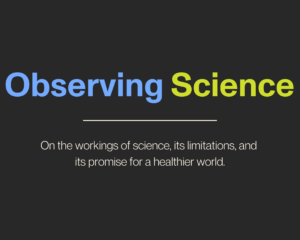Say the Word
Academic research has the opportunity to privilege the voices of people with disabilities, rather than assuming that disability is inherently negative.

Read Time: 4 minutes
Published:
For some reason, the presence of disability generates a feeling of awkwardness in many individuals. I see and experience this every day. I could be strolling down a wide sidewalk in my wheelchair, and people will loudly and dramatically move to the other side—or even cross the road to avoid me! Other times, individuals will stumble on their words when asking if I am looking for an accessible restroom or parking because they are trying to not be offensive or say the wrong thing. Somewhere along the way, “disability” became a bad word that people avoid saying.
A growing movement called #SayTheWord was started by disability community activist Lawrence Carter-Long to draw attention to terminology. This movement encourages everyone to use the word “disability.” What I love about it is that it came from our community. In part, the movement is about reclaiming the word “disability” as a part of disabled identity. It is also designed to educate others about how made up words or euphemisms about disability are harmful. Some of these are: “handicapable” or “differently-abled” or “special needs” or “physically challenged.” These are often created by well-meaning, non-disabled people. If we dance around the term or intentionally avoid it, like the people trying to avoid me on the sidewalk, we are reinforcing negative stereotypes about disability: that it is something to fear, to avoid, or even to be ashamed of. Internalizing this negativity is not healthy. Plus, disabled people are tired of non-disabled people telling us what they think is best for us.
The disability community is saying “hey now, remember our other mantra”: #NothingAboutUsWithoutUs. This slogan has provided the foundation for the disability rights movement, emphasizing the fundamental importance of including voices from disabled people in policies that affect us. Let’s not make these decisions without consulting disabled people. Avoidance of the term “disability” ends up operating as a form of cultural erasure and denies disability as a marker of identity and diversity.
Recently, I co-authored an article in Rehabilitation Psychology about the term “disabled” and the #SayTheWord movement. Written entirely by disabled women psychologists and researchers, the article provides historical context and explains how disability can be valued as a form of diversity. Our hope is for the general population to learn about this conversation and how to be an ally to promote positivity and embrace our diverse identities.
Embracing the word “disability” and normalizing it as an aspect of identity has the potential to lead to positive psychological health outcomes.
The Centers for Disease Control and Prevention report that 61 million (one in four) Americans have some type of disability that affects major life activities. Despite these statistics, many still still feel uneasy talking about disability. Part of the solution is to normalize the term–to #SayTheWord–and have more conversations. For example, the #SaytheWord movement helps us see many different ways that academic research has the opportunity to privilege the voices of people with disabilities, rather than assuming that disability is inherently negative. I do this in my research about disability identity development.
My belief is that disability can be a core part of a person’s identity, though it is not always the most important aspect of a person’s identity. Disability identity is a person’s sense of self as a person with a disability as well as their feelings about or connection to the broader disability community. Embracing the word “disability” and normalizing it as an aspect of identity has the potential to lead to positive psychological health outcomes.
A healthy, intact identity helps to foster a positive sense of self. A positive disability identity has the potential to better equip individuals when facing ableism or discrimination. Listening to people with disabilities talk about their identities also has the potential to lead to important organizational change. This movement has gained traction with the recent American Psychological Association Manual calling for identity-first language (disabled person, blind person) or person-first language (person with autism, person with dyslexia). This evolution of terminology is another example of how the voices of the disabled community are being shared, amplified, and heard.
This year marks 30 years since the Americans with Disabilities Act was passed, and disabled people are reclaiming our identities. We are not going anywhere, so let’s work together and share the sidewalk.
Photo by Oleg Laptev on Unsplash


